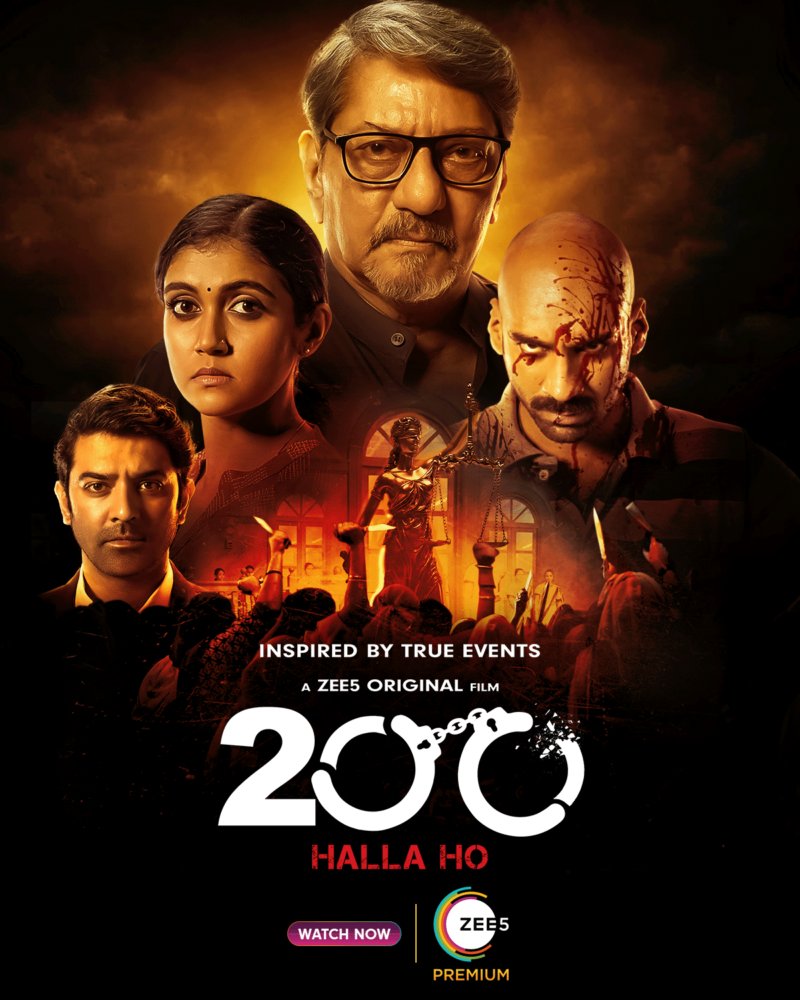Amazed, I was truly amazed to see Amol Palekar back in action. Last seen in a Hindi film exactly 20 years back in a brief role in Aks [2001], and a reasonably meatier role even further back in Teesra Kaun? [1994], Amol Palekar hasn’t really been lured by the sound of ‘lights, camera, action’ for ages now. This is the reason why there must have been something truly enticing about 200 Halla Ho that brought him back on the sets. Well, 15 minutes into the film and I could sense the temptation he must have had to get back on the film scene all over again.
First and foremost, it’s shocking to know that the real incidents on which the film is based hadn’t happened way too long in time. At the turn of the millennium, it had actually happened in Nagpur where dozens of women had attacked a rapist in the court and mutilated him to death after years of oppression. That’s the core of 200 Halla Ho where 200 women across all age groups storm the court and eliminate the evil [Sahil Khattar]. While the opening sequence of the film establishes the incident, you do get good enough idea around why this transpired.
Men and women from different walks of life get into action. A journalist [Saloni Batra] supports the lynching that has taken place, a leader [Rinku Rajguru] triggers the action followed by the debate, a lawyer [Barun Sobti] steps ahead in defense and an activist [Flora Saini] wants to get to the bottom of the truth, before her own political aspirations come into play.
However, the man who wants to take a balance view of it all instead of being carried away by the emotions, gender, caste or politics is retired judge, Amol Palekar. As the head of the fact finding committee which is set up to give its findings to the government, he acknowledges what’s happening around him, but doesn’t fall to the temptation of delivering an instant verdict. He respects the law, plays by the books, holds not just others but even himself accountable for the actions that follow, and then eventually leads the case too when the chips are down.
This is where one gets to see the brilliant actor all over again, and personally what impressed me the most was his command over the language. Be it Hindi or English, his dialogue delivery is impeccable, punctuation just apt and pauses timely. Moreover, for someone who is in his 70s, he exhibits very good poise and grace in his body language, which further makes his character respectable.
No wonder, the ones who are in front of him pale in comparison. Rinku Rajguru is decent, but then at times uneven in her performance. She ups the game when she is front of the senior actor but goes surprisingly flat in presence of others, most notably Barun Sobti who plays her ex-boyfriend. The actor himself comes across as way too lazy, and though I expected that at least in the courtroom scenes he would get a bit fired away, none of that happens. As for Saloni Batra, she too is quite plain and one dimensional, which doesn’t help her cause. In fact compared do them all, Flora Saini still holds fort.
In that aspect, Sahil Khattar, who plays the villain, is pure evil. He is filmy in appeal and though there is no novelty per se that he brings in his act (something that Sunny Hinduja had done so very well in a similar character that he played in Mardaani 2), he does well enough to make audiences hate him. Ditto for Upendra Limaye who plays a corrupt cop.
It’s the corruption of law, order and caste system that director Sarthak Dasgupta brings well in 200 Halla Ho. Though he doesn’t quite go all the way in terms of exposing the system, a la Prakash Jha, at some levels he does end up making a point. Also, he balances the realistic and commercial elements of the core subject matter that he had in hand.
200 Halla Ho is not for the faint treated and is by no means an easy watch. However, if you are prepared for a hard hitting film then this one can be given a good watch, especially for Amol Palekar.

